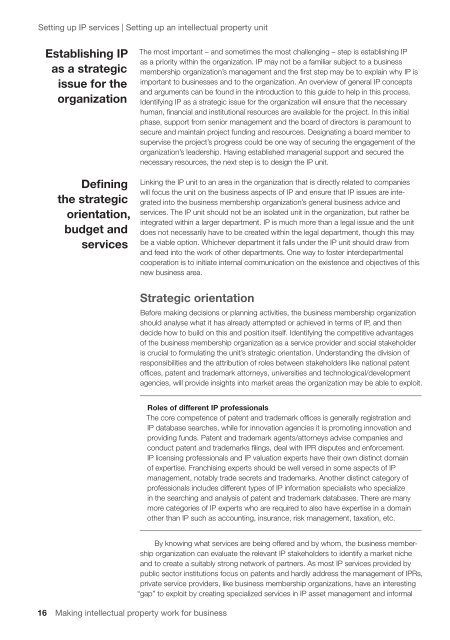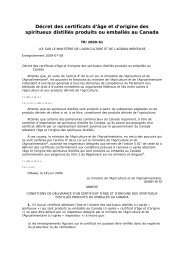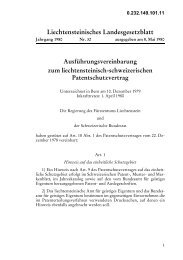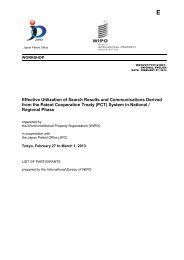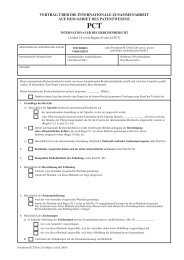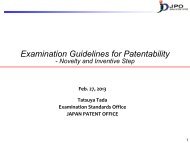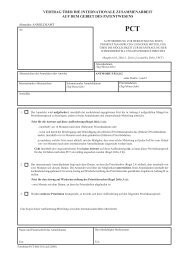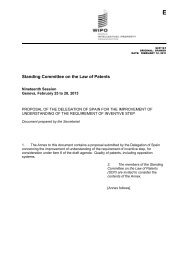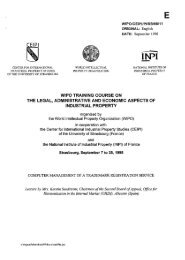Making intellectual property work for business - World Intellectual ...
Making intellectual property work for business - World Intellectual ...
Making intellectual property work for business - World Intellectual ...
Create successful ePaper yourself
Turn your PDF publications into a flip-book with our unique Google optimized e-Paper software.
Setting up IP services | Setting up an <strong>intellectual</strong> <strong>property</strong> unit<br />
Establishing IP<br />
as a strategic<br />
issue <strong>for</strong> the<br />
organization<br />
Defining<br />
the strategic<br />
orientation,<br />
budget and<br />
services<br />
16 <strong>Making</strong> <strong>intellectual</strong> <strong>property</strong> <strong>work</strong> <strong>for</strong> <strong>business</strong><br />
The most important – and sometimes the most challenging – step is establishing IP<br />
as a priority within the organization. IP may not be a familiar subject to a <strong>business</strong><br />
membership organization’s management and the first step may be to explain why IP is<br />
important to <strong>business</strong>es and to the organization. An overview of general IP concepts<br />
and arguments can be found in the introduction to this guide to help in this process.<br />
Identifying IP as a strategic issue <strong>for</strong> the organization will ensure that the necessary<br />
human, financial and institutional resources are available <strong>for</strong> the project. In this initial<br />
phase, support from senior management and the board of directors is paramount to<br />
secure and maintain project funding and resources. Designating a board member to<br />
supervise the project’s progress could be one way of securing the engagement of the<br />
organization’s leadership. Having established managerial support and secured the<br />
necessary resources, the next step is to design the IP unit.<br />
Linking the IP unit to an area in the organization that is directly related to companies<br />
will focus the unit on the <strong>business</strong> aspects of IP and ensure that IP issues are integrated<br />
into the <strong>business</strong> membership organization’s general <strong>business</strong> advice and<br />
services. The IP unit should not be an isolated unit in the organization, but rather be<br />
integrated within a larger department. IP is much more than a legal issue and the unit<br />
does not necessarily have to be created within the legal department, though this may<br />
be a viable option. Whichever department it falls under the IP unit should draw from<br />
and feed into the <strong>work</strong> of other departments. One way to foster interdepartmental<br />
cooperation is to initiate internal communication on the existence and objectives of this<br />
new <strong>business</strong> area.<br />
Strategic orientation<br />
Be<strong>for</strong>e making decisions or planning activities, the <strong>business</strong> membership organization<br />
should analyse what it has already attempted or achieved in terms of IP, and then<br />
decide how to build on this and position itself. Identifying the competitive advantages<br />
of the <strong>business</strong> membership organization as a service provider and social stakeholder<br />
is crucial to <strong>for</strong>mulating the unit’s strategic orientation. Understanding the division of<br />
responsibilities and the attribution of roles between stakeholders like national patent<br />
offices, patent and trademark attorneys, universities and technological/development<br />
agencies, will provide insights into market areas the organization may be able to exploit.<br />
Roles of different IP professionals<br />
The core competence of patent and trademark offices is generally registration and<br />
IP database searches, while <strong>for</strong> innovation agencies it is promoting innovation and<br />
providing funds. Patent and trademark agents/attorneys advise companies and<br />
conduct patent and trademarks filings, deal with IPR disputes and en<strong>for</strong>cement.<br />
IP licensing professionals and IP valuation experts have their own distinct domain<br />
of expertise. Franchising experts should be well versed in some aspects of IP<br />
management, notably trade secrets and trademarks. Another distinct category of<br />
professionals includes different types of IP in<strong>for</strong>mation specialists who specialize<br />
in the searching and analysis of patent and trademark databases. There are many<br />
more categories of IP experts who are required to also have expertise in a domain<br />
other than IP such as accounting, insurance, risk management, taxation, etc.<br />
By knowing what services are being offered and by whom, the <strong>business</strong> membership<br />
organization can evaluate the relevant IP stakeholders to identify a market niche<br />
and to create a suitably strong net<strong>work</strong> of partners. As most IP services provided by<br />
public sector institutions focus on patents and hardly address the management of IPRs,<br />
private service providers, like <strong>business</strong> membership organizations, have an interesting<br />
“gap” to exploit by creating specialized services in IP asset management and in<strong>for</strong>mal


